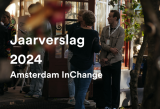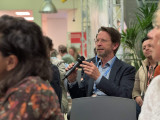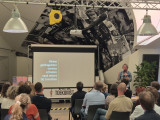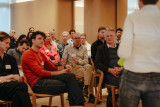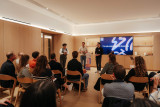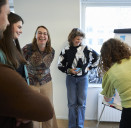Op 13 maart komt ons partnernetwerk samen voor de eerste Kennis- en Demodag van 2025. Dit keer zijn we te gast bij het kantoor van het elektrische automerk NIO aan de Leidsestraat. Dit historische gebouw, gebouwd in 1891 voor de New York Life Insurance Company, was destijds een van de hoogste kantoorpanden in Amsterdam. Sinds 2024 huisvest het dus de Europese flagshipstore van NIO.
Over onze Kennis- en Demodagen
De Amsterdam Smart City Demodagen zijn regelmatig terugkerende middagen bedoeld om de voortgang van de verschillende innovatieprojecten aan elkaar te presenteren, hulpvragen op tafel te leggen, dilemma’s te delen en meer partners te betrekken bij een project en deze vraagstukken verder te brengen.
We starten de middag met een Kennissessie waarin een kennispartner het netwerk verrijkt met specifieke onderwerpen die van belang zijn voor Amsterdam InChange en de transities waar wij aan werken. Daarna gaan we uiteen voor de Werksessies. We sluiten de middag af met een hapje en drankje. De middagen kenmerken zich door een zeer open en vrolijke sfeer.
Kennissessie
Big Tech | Sander van der Waal (Waag Futurelab)
Digitalisering is niet meer weg te denken uit onze samenleving. En met de ontwikkelingen rondom AI wordt onze afhankelijkheid van digitale technologie alleen maar groter. Hiermee creëren we voor steeds grotere aspecten van onze samenleving ook afhankelijkheden naar technologische aanbieders, die over het algemeen in de VS of in China gevestigd te zijn.
De politieke ontwikkelingen in Amerika en de positionering die CEO's van big-tech-bedrijven daarin hebben ingenomen, leiden tot steeds meer ongemak over deze afhankelijkheden. Het kan ook anders. In deze kennissessie kijken we naar de wereld achter onze technologie, en welke mogelijkheden we hebben om meer grip te krijgen op onze technologie. Sander van der Waal van Waag Futurelab neemt je mee in de bedreigingen rondom technologische afhankelijkheden. Daarnaast geeft hij concrete handvatten en keuzes die je kan maken om zelf vat te krijgen op je technologie.
Werksessies
Energie | Bewonersparticipatie in warmtenetten | Wouter Huver (Gemeente Haarlemmermeer)
De Gemeente Haarlemmermeer startte in Rijsenhout een participatietraject voor de energietransitie, eerst als proeftuin voor aardgasvrije wijken. Na het mislopen van de subsidie werd een prijsvraag uitgeschreven, waaruit twee winnende ideeën kwamen: een warmtenet op aquathermie en een buurtbatterij. Enthousiaste inwoners werkten deze verder uit en staan nu, samen met de gemeente, aan de vooravond van versnelling. Dit roept vragen op over samenwerking en rolverdeling. In deze werksessie verkennen we: Hoe laat je bewonersinitiatieven bloeien? Hoe verdeel je rollen effectief? En hoe ga je om met verantwoordelijkheid en participatie?
Digitaal | Regionale krachten bundelen voor een nationale AI strategie | Laetitia Stuijt en Bart Krull (Amsterdam Economic Board)
Nederland wil zijn positie in AI versterken met onder meer de geplande AI Fabriek in Groningen en de recent aangekondigde Europese investeringen in AI-infrastructuur. Om deze kansen optimaal te verzilveren is samenwerking tussen AI-regio’s essentieel. Hoe kunnen Amsterdam, Eindhoven en Groningen elkaar versterken in plaats van beconcurreren? In deze interactieve werksessie brengen we specialisten uit diverse domeinen samen om dit vraagstuk te verdiepen. We onderzoeken hoe de regio’s elkaar kunnen aanvullen om de nationale AI-strategie te versterken en welke concrete stappen nodig zijn om dit te realiseren.
Algemeen | Onze telefoons zijn gegijzeld: op zoek naar alternatieven voor big tech | Simone van der Burg en Danny Lämmerhirt (Waag Futurelab)
Mobiele telefoons en apps maken publieke organisaties kwetsbaar. Gemeenten, ministeries en kennisinstellingen verliezen grip op hun data door afhankelijkheid van commerciële software. Maar het kan anders. Door gebruik te maken van open-source software en systemen, die aangepast zijn aan de behoeften van publieke organisaties. Als deze hun ideale mobiele telefoon konden ontwerpen, hoe zou die eruitzien? In deze interactieve workshop gaan we met deze vraag aan de slag. Samen brengen we de voorwaarden en eisen voor een ideale mobiele werktelefoon in kaart. Deze workshop wordt georganiseerd in het kader van het NGI-project Mobifree.
Mobiliteit | Zero Emissie Stadslogistiek: de Food Center Amsterdam casus | Interdisciplinaire afstudeerkring
Vier HvA studenten, Stan, Vanessa, Jay en Chanel, verdiepen zich met onze interdisciplinaire afstudeerkring in het Zero Emissie Stadslogistiek onderwerp. Met een focus op het Food Center Amsterdam (FCA) brengen ze in kaart wat de ingang van de Zero Emissiezones en de verplichte krimp van FCA betekent voor deze logistieke Hub. Ook is er in hun onderzoek aandacht voor de ‘micro ondernemer’ in de foodsector, en hun uitdagingen en kansen in de transitie naar zero emissie vervoer. Voor inspiratie en een goed beeld van wat al is gedaan, gaan de studenten in deze sessie in gesprek met specialisten uit ons netwerk die op de hoogte zijn van onderzoek en beleid op dit onderwerp.
Pitches
We sluiten de middag af met drie pitches over lopende projecten in ons netwerk. Waar staat het netwerk nu? En wat zijn de plannen voor 2025?
Nutshubs
Hoe kunnen we steden zo ontwerpen dat ze klimaatneutraal, modulair en toekomstbestendig zijn? De Gemeente Amsterdam heeft de circulaire nutshub geïnitieerd — een innovatief concept dat uitdagingen op het gebied van ruimtegebruik, financiering, technologie, esthetiek en klimaatbestendigheid aanpakt. Het project bevindt zich momenteel in de onderzoeks- en uitvoeringsfase, waarin de plannen verder worden uitgewerkt. Samen met een coalitie van partners bereidt de Gemeente Amsterdam een aanvraag voor de EU Horizon Call voor om de impact op grotere schaal te realiseren.
27 laadpleinen in Amsterdam
Hoe kunnen 27 overheidsgebouwen in Amsterdam, ondanks netcongestie, dienen als oplaadhubs voor elektrische voertuigen? SPIE heeft dit vraagstuk binnen ons netwerk ingebracht om innovatieve en schaalbare oplossingen te verkennen. We onderzoeken technologieën zoals waterstofgeneratoren en slim energiebeheer om netbeperkingen en regelgeving te overbruggen. Op dit moment richten we ons op het vaststellen van de randvoorwaarden en het identificeren van de meest geschikte locaties voor de oplaadhubs.
Zero-emissie stadslogistiek
Met de start van 2025 zijn de eerst Zero Emissie zones een feit. Sinds september is er een enthousiaste werkgroep samengekomen op dit complexe transitieonderwerp. We gingen aan tafel met vragen als; hoe verhouden beleid en praktijk zich tot elkaar, wat zijn de uitdagingen m.b.t. kleine ondernemers en stadslogistiek, en wat kunnen we van elkaar leren in de regio? Er is deze maand een interdisciplinaire afstudeerkring van de HvA gestart in opdracht van de Vervoerregio en de werkgroep. Hoe zijn we hier gekomen, en wat houdt die afstudeerkring precies in? Je hoort er meer over in deze pitch update!
Klinkt het programma interessant? Je bent welkom om aan te sluiten. Laat het ons weten en stuur een korte motivatie naar pelle@amsterdaminchange.com. De Kennis- en Demodag is van 12:30-17:00 met een borrel na afloop.
